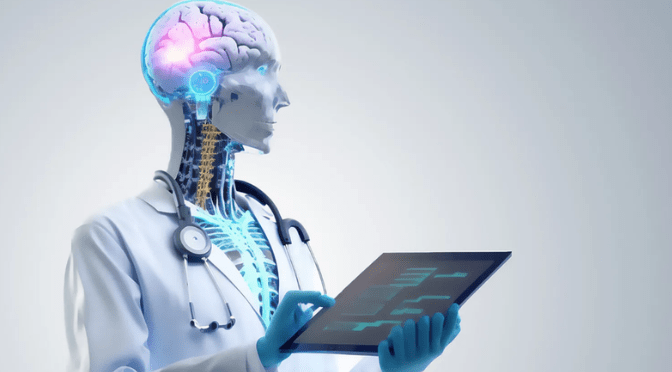The world of healthcare is evolving rapidly with the introduction of Artificial Intelligence (AI). A technology that was once relegated to the world of science fiction is now infiltrating various industries, and healthcare is no exception. From diagnostics to personalized treatment plans, AI is revolutionizing how we approach health and wellness. But the most significant question on everyone’s mind is: Could AI eventually replace doctor visits entirely? In this article, we will explore how AI is reshaping the healthcare landscape, its benefits, limitations, and the potential for AI to diagnose health conditions more accurately than human doctors.
The Rise of AI in Healthcare
AI is becoming increasingly embedded in our daily lives, from virtual assistants like Siri to algorithms that suggest which movies to watch. However, its role in healthcare is perhaps one of the most exciting and controversial. The rise of AI in healthcare began in the 1970s but has gained significant momentum in recent years due to advancements in machine learning, natural language processing, and big data.
AI has been used to assist healthcare professionals in diagnostics, predicting disease outbreaks, and even managing patient records. However, the recent breakthrough is the development of AI systems capable of providing preliminary diagnoses without the need for human intervention. These systems use vast amounts of data from medical literature, patient histories, and diagnostic tests to evaluate symptoms, interpret results, and provide diagnostic recommendations.
AI is already being used in many healthcare fields, including radiology, cardiology, oncology, and dermatology. For example, AI-powered systems can analyze X-rays and CT scans to detect conditions such as tumors, fractures, and cardiovascular diseases. Moreover, AI systems can analyze vast datasets of medical records to identify patterns that may indicate early signs of disease, often catching issues before they become noticeable to human doctors.
How Does AI Diagnose Health Conditions?
AI diagnoses health conditions through a process called machine learning, where algorithms are trained on large datasets of medical information to identify patterns. In practice, AI systems use data collected from various sources such as electronic health records (EHRs), medical imaging, and even genetic testing. Once an AI system has been trained, it can analyze the data and provide recommendations or diagnoses that might not be immediately obvious to a human healthcare provider.
For instance, when diagnosing a patient with a potential respiratory illness, an AI algorithm can analyze lung X-rays, look for patterns of abnormality, and compare them against thousands of similar cases. It can then cross-reference these findings with other diagnostic data, such as the patient’s age, medical history, and vital signs, to provide a highly accurate diagnosis. This level of pattern recognition is what makes AI such a promising tool in healthcare.
The Key Benefits of AI in Diagnosing Health Conditions
- Speed and Efficiency One of the most significant advantages of AI in healthcare is its speed. Traditional diagnostic methods, especially those involving human input, can take days or even weeks. In contrast, AI can process vast amounts of data in real time, providing quicker results. Whether it’s a matter of reading X-ray images or analyzing blood tests, AI can cut down on the time it takes to arrive at a diagnosis, allowing for faster treatment.
- Increased Accuracy AI is capable of analyzing more data than any human doctor can process. It can detect patterns in medical imaging, laboratory results, and patient history that may be missed by even the most experienced healthcare providers. For example, AI systems trained on dermatology datasets can identify skin cancer at its earliest stages, sometimes with greater accuracy than human dermatologists.
- Cost Efficiency AI can potentially reduce healthcare costs by minimizing unnecessary tests, speeding up diagnoses, and reducing the need for specialist consultations. AI systems can help general practitioners manage routine diagnoses, allowing specialists to focus on more complex cases. Additionally, by catching diseases earlier, AI can reduce the cost of long-term treatments for chronic illnesses.
- Personalized Healthcare AI-powered health systems can tailor diagnoses and treatment plans based on individual patient data, creating more personalized healthcare. This goes beyond just considering a patient’s symptoms; AI can factor in genetic data, lifestyle choices, and environmental factors, giving healthcare providers insights into the most effective treatment options.
- Remote Healthcare and Telemedicine AI systems are essential in telemedicine, enabling patients in remote or underserved areas to receive medical attention without needing to travel long distances. Virtual consultations powered by AI systems can help diagnose conditions based on the information a patient provides, with the system making recommendations for treatment or referring the patient to a specialist if necessary.
Can AI Replace Doctor Visits?
While the benefits of AI in healthcare are immense, the question remains: Can AI truly replace doctor visits? The short answer is no, not entirely, at least not in the near future. However, it is transforming how doctor visits occur, and it is reshaping the role of healthcare professionals.
AI can assist in diagnosing certain conditions, but there are aspects of human interaction and empathy in medicine that AI cannot replicate. Many medical conditions require a personal touch—empathy, understanding, and nuanced judgment that comes from years of training and human experience. For instance, in mental health care, a doctor’s ability to understand a patient’s emotional state and provide comfort is something AI cannot replace.
Moreover, while AI systems can analyze medical data and suggest diagnoses, they lack the ability to integrate new information in the same way a human doctor can. For example, in complex cases involving multiple conditions, doctors rely on their judgment and experience to interpret data and decide the best course of action. AI, though highly effective, is still limited by its programming and the data it has been trained on.
That said, AI has the potential to drastically reduce the frequency and necessity of some doctor visits. For routine check-ups, screenings, and early-stage diagnosis of certain conditions, AI could be used as a first point of contact. In cases where the AI system detects anomalies or conditions that require further investigation, it could refer the patient to a human doctor for more detailed examination.
The Ethical Concerns of AI in Healthcare
As AI becomes more involved in diagnosing health conditions, ethical concerns arise. Some of the key issues include:
- Data Privacy: With AI systems using vast amounts of personal health data, maintaining patient privacy and security becomes critical. Misuse or theft of this sensitive data could lead to serious consequences, including identity theft and discrimination.
- Bias in AI Algorithms: AI systems learn from the data they are trained on, and if the training data is biased, the AI could make biased decisions. For example, if an AI system is trained primarily on data from one demographic group, it might not be as accurate when diagnosing individuals from other groups. Addressing bias in AI is a significant challenge to ensuring fairness in healthcare.
- Lack of Accountability: If an AI system makes an incorrect diagnosis, it can be difficult to determine who is responsible. Should the AI company be held accountable, or does the blame lie with the healthcare provider who relied on the AI’s recommendation? This issue of accountability is still being debated in the medical community.
- Job Displacement: As AI takes on more diagnostic roles, some worry about job displacement for healthcare professionals. However, many experts argue that AI will not replace doctors but will enhance their capabilities, allowing them to focus on more complex aspects of patient care.
AI in Personalized Health Management
While AI might not entirely replace doctor visits, it is paving the way for personalized health management. AI systems are already being used to track health metrics through wearable devices such as smartwatches, fitness trackers, and continuous glucose monitors. These devices collect data in real-time, and AI systems analyze this information to provide insights into the user’s health.
For example, AI-powered wearables can track a user’s heart rate, sleep patterns, and physical activity, providing actionable insights to prevent diseases such as cardiovascular conditions and diabetes. Furthermore, AI can analyze genetic data to predict the likelihood of certain diseases, allowing for early interventions and lifestyle changes that can mitigate health risks.
The Future of AI in Healthcare
Looking ahead, the future of AI in healthcare is bright. With ongoing advancements in deep learning, natural language processing, and data integration, AI is expected to become even more sophisticated in diagnosing, predicting, and managing health conditions.
In the future, we could see AI-powered systems that perform continuous health monitoring, providing real-time feedback to patients and doctors. These systems could be integrated into everyday life, from smart homes to wearable technology, making healthcare more accessible and personalized than ever before.
AI may also play a key role in drug development. By analyzing medical literature, clinical trial data, and patient outcomes, AI can accelerate the discovery of new treatments and therapies. This could significantly reduce the time and cost it takes to bring new drugs to market, ultimately improving healthcare outcomes worldwide.
Frequently Asked Questions (FAQs)
1. Can AI replace human doctors?
AI cannot fully replace human doctors. While AI can assist in diagnosing and managing health conditions, the human touch, empathy, and clinical judgment are still essential in healthcare. AI is more of a tool to enhance the capabilities of doctors rather than a replacement.
2. Is AI in healthcare accurate?
AI has shown promising results in various healthcare fields, including radiology and dermatology, with accuracy levels comparable to or even surpassing human doctors in some cases. However, AI’s accuracy depends on the quality of the data it’s trained on and how well the algorithm is developed.
3. What are the ethical concerns of using AI in healthcare?
Key ethical concerns include data privacy, the risk of biased algorithms, accountability for AI errors, and potential job displacement for healthcare workers. It is essential to address these concerns to ensure that AI is used responsibly in healthcare.
4. How can AI improve personalized healthcare?
AI can analyze data from wearable devices, genetic tests, and medical records to provide personalized health recommendations. It can also help in early disease detection and the creation of customized treatment plans tailored to individual needs
5. Can AI diagnose mental health conditions?
AI has made significant strides in diagnosing certain mental health conditions by analyzing speech patterns, facial expressions, and behavioral data. However, the complexity of mental health makes it a challenge for AI to fully replicate the nuanced judgment of a trained mental health professional.
6. Will AI make healthcare more affordable?
AI has the potential to reduce healthcare costs by streamlining processes, diagnosing diseases earlier, and reducing the need for unnecessary tests and procedures. However, it is still essential to ensure that AI is accessible to all populations, particularly in low-income areas.
AI is undoubtedly shaping the future of healthcare, and while it may not entirely replace doctor visits, it is significantly improving the way we approach health diagnostics, treatment, and personalized care. The journey towards a future where AI plays a central role in healthcare has just begun, and the possibilities are exciting, from faster diagnosis to more affordable and accessible healthcare for all.





